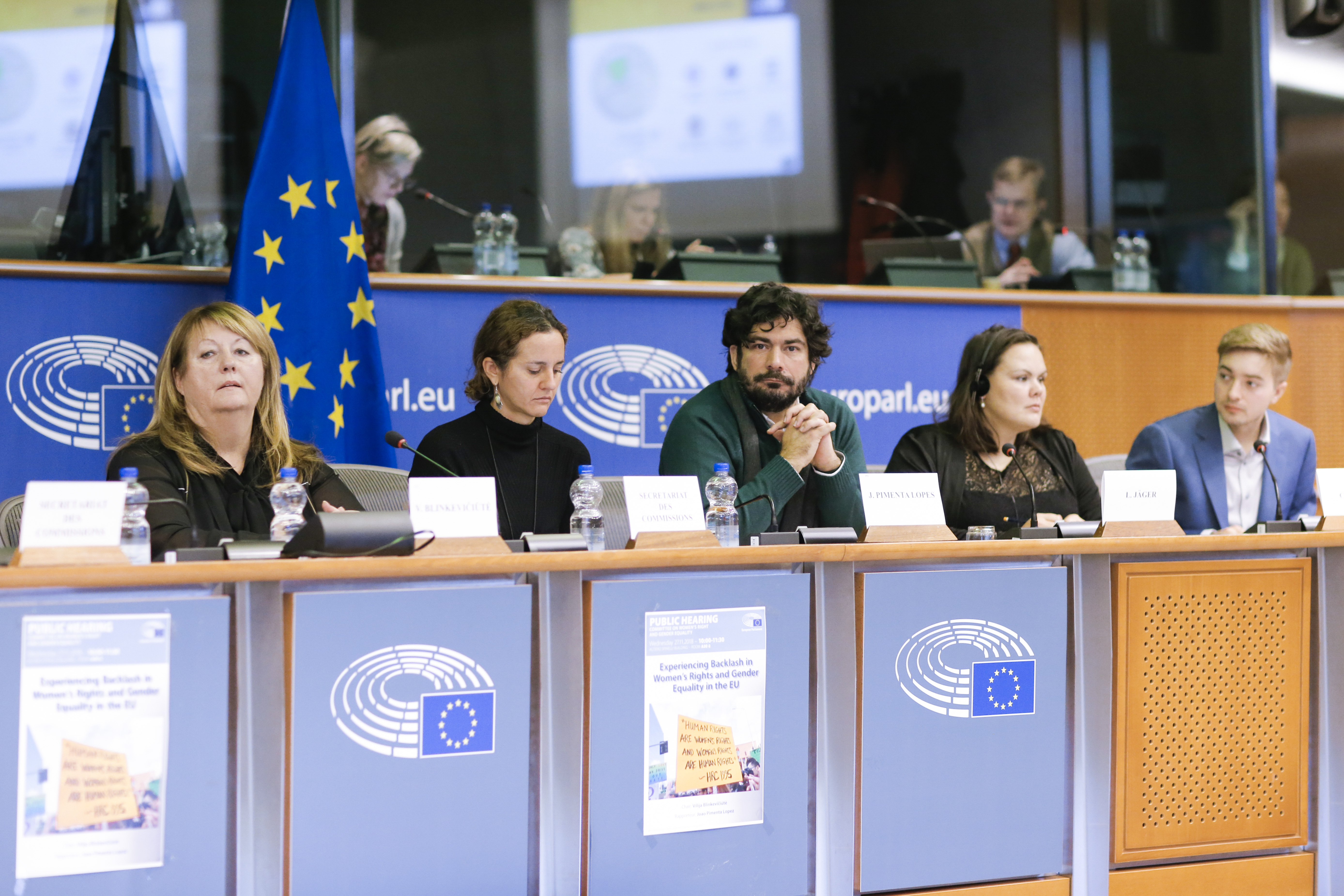Most forms of violence against women, such as intimate partner violence, marital rape, and economic violence are constrained to the private spheres of home and family. The dichotomy of public-private life and the idea that the law should not interfere with private concerns, represented one of main challenges to the protection of women’s rights for decades. In Portugal there is an old saying, “entre marido e mulher, ninguém mete a colher” that means that nobody has the right to interfere in a marriage. One of the main pillars of Portuguese society is the traditional view of what constitutes as ‘family’. Old-fashioned gender stereotypes that limit women’s place to family life increase their exposure to extreme violence in ‘romantic relationships’ and ultimately, femicide.
On International Women’s Day 2019, thousands of people came out to protest on the streets of Lisbon and throughout the country.
Like other societies where a culture of misogyny and sexism strongly prevails, domestic violence is at epidemic levels in Portugal. According to the report made by the Observatory on Murdered Women of the Portuguese feminist organisation UMAR, 503 women were murdered by their partner or former partner from 2004-2018. In the first three months of 2019, 12 women were killed by their partners. These homicides occurred in the context of a prolonged situation of intimate partner violence and it is proven that people close to the victim and abuser are aware of the issue, but choose to turn a blind eye. The 2018 report on National security also states that 78.6% of victims of domestic violence are women while 83.5% of reported abusers are men. This highlights that this is not just a security issue but rather a gender issue that should be treated as such.
Sexist Judges at the Center of the Controversy
The mentioned public-private dichotomy might not now pose as great a difficulty to the effectiveness of women’s rights protection on a legislation level. It is in the judicial system that resides the biggest challenge for an adequate implementation of the existent laws. Less than half of women decide to denounce intimate partner violence. For example, in 2017 – 85% saw their cases being closed before reaching the courts while an insignificant percentage of abusers are prosecuted and made accountable for their crimes. Portuguese judges who are typically old conservative men, tend to stand by the principle that marriage is a private matter and will rule in conformity with it.
A number of court rulings have caused public outrage as women in Portugal continue to not only be victims of intimate partner violence, but revictimized by an unjust system. The infamous ruling of Judge Neto Moura where he blames the victim for the heinous acts committed upon her by quoting biblical references on adultery to justify the violence, demonstrates a complete disregard for women’s lives. If institutions who are meant to protect and uphold the well-being of all citizens in equal measure, are not only failing to do so but are actively contributing to the system of revictimization, then it begs the question – who can women turn to for help?
Therefore, on International Women’s Day 2019, thousands of people came out to protest on the streets of Lisbon and throughout the country. To date, it was the largest ever turnout for the Women’s March in Portugal.
Feminist MEPs can be Part of the Solution
The recognition of violence against women and girls (VAWG) as a human rights issue has been a slow and incremental process. Addressing the issue implies the acceptance of systematic discrimination against women in deeply-rooted patriarchal societies where traditional family values are fundamental. VAWG is recognised by states, international human rights institutions, and the European Parliament (EP) as a serious human rights violation. Nonetheless, Portugal and more specifically, the Portuguese judicial system has been failing to identify and adequately combat the crime that affects thousands of women across the country. The impact and the effectiveness of the existing laws addressing VAWG are remarkably weak as it depends almost exclusively on the endeavors of the pale male catholic judges.
For the past few decades, the EP produced several resolutions addressing VAWG. The first milestone was the EP’s resolution of 6 October 1997 on the need to develop an EU-wide campaign on the total rejection of violence against women. The resolution emphasised that training for judges dealing with cases of violence based on gender should be made mandatory. The European institutions have also been responsible for the Directive on Victims’ Rights (an important legal instrument for the protection of victims, including of intimate partner violence). The EP consistently supported the idea of the EU’s accession to the Istanbul Convention, highlighting that it would send a strong message about the commitment to eradicate VAWG.
Future MEPs can continue to address the violence perpetuated by Portugal’s judiciary and put mounting pressure on the member state to take a zero-tolerance approach to their failings.
In February 2019, the EP also passed a resolution on the current backlash to women’s rights and gender equality within the EU and called for the ‘need to implement preventive and protective measures for women and girls in the face of gender-based violence and to bring the perpetrators to justice’. Coincidence or not, this resolution was proposed by the Portuguese Member of Parliament (MEP) João Pimenta Lopes, Vice-president of the Committee on Women’s Rights and Gender Equality. At the end of their mandate, MEPs reminded Member States about their commitment to address VAWG and to effectively protect women.
Young feminists might be asking themselves why they should be bothered to go to the polling stations for the upcoming EU election. The connection may not be obvious; however, if we care about the safety and well-being of women, and their ability to seek justice, we need not only vote but vote for feminist candidates. By doing so, future MEPs can continue to address the violence perpetuated by Portugal’s judiciary and put mounting pressure on the member state to take a zero-tolerance approach to their failings.





[…] (2) Portugal: Young feminist Europe: Can Feminist MEPs Protect from Portugal‘s System of Violence […]